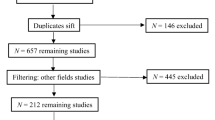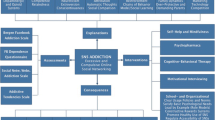Abstract
This study explored notable and measurable differences between intense users and less intense internet users in college students as they pursue well-being in the context of positive psychology. A total of 1024 male students from four general universities in China, served as study participants; data were collected via Internet Addiction Test, Multidimensional Scale of Perceived Social Support, Online Social Support Scale, and Subjective Well-Being Scale. Results showed that compared to less intense internet users, intense users perceive limited real-life social support but considerable online social support. For intense users, online social support influences their subjective well-being partially through the intervening variable of self-esteem; for the less intense internet users, online social support has an insignificant predictive effect on self-esteem or well-being.


Similar content being viewed by others
References
Amichai-Hamburger, Y., & Ben-Artzi, E. (2003). Loneliness and internet use. Computers in Human Behavior, 19(1), 71–80.
Braithwaite, D. O., Waldron, V. R., & Finn, J. (1999). Communication of social support in computer-mediated groups for people with disabilities. Health Communication, 11(2), 123–151.
Cao, F.-l., & Su, L.-y. (2007). Internet addiction among Chinese adolescents: prevalence and psychological features. Child: Care, Health and Development, 33(3), 275–281.
Cao, F., Su, L., Liu, T., & Gao, X. (2007). The relationship between impulsivity and internet addiction in a sample of Chinese adolescents. European Psychiatry, 22(7), 466–471.
Charney, T., & Greenberg, B. S. (2002). Uses and gratifications of the internet. Communication technology and society: Audience adoption and uses, 379–407.
Cheung, P. C., & Lau, S. (1985). Self-esteem: its relationship to the family and school social environments among Chinese adolescents. Youth and Society, 16(4), 438–456.
Chou, K.-L. (2000). Assessing Chinese adolescents’ social support: the multidimensional scale of perceived social support. Personality and Individual Differences, 28(2), 299–307.
Diener, E., & Diener, M. (1995). Cross-cultural correlates of life satisfaction and self-esteem. Journal of Personality and Social Psychology, 68(4), 653–663.
Diener, E., & Suh, E. M. (2000). Measuring subjective well-being to compare the quality of life of cultures. Culture and subjective well-being, 3–12.
Dong, G., Lu, Q., Zhou, H., & Zhao, X. (2010). Impulse inhibition in people with internet addiction disorder: electrophysiological evidence from a go/NoGo study. Neuroscience Letters, 485(2), 138–142.
Finfgeld, D. L. (2000). Therapeutic groups online: the good, the bad, and the unknown. Issues in Mental Health Nursing, 21(3), 241–255.
Hardie, E., & Tee, M. Y. (2007). Excessive internet use: the role of personality, loneliness and social support networks in internet addiction. Australian Journal of Emerging Technologies and Society, 5(1), 331–345.
Hari, R., Himberg, T., Nummenmaa, L., Hämäläinen, M., & Parkkonen, L. (2013). Synchrony of brains and bodies during implicit interpersonal interaction. Trends in Cognitive Sciences, 17(3), 105–106.
He, F., Guan, H., Kong, Y., Cao, R., & Peng, J. (2014). Some individual differences influencing the propensity to happiness: insights from behavioral economics. Social Indicators Research, 119, 897–908.
Hsee, C. K., Hastie, R., & Chen, J. (2008). Hedonomics: bridging decision research with happiness research. Perspectives on Psychological Science, 3(3), 224–243.
Johansson, A., & Götestam, K. G. (2004). Internet addiction: characteristics of a questionnaire and prevalence in Norwegian youth (12–18 years). Scandinavian Journal of Psychology, 45(3), 223–229.
Kessler, R. C., Price, R. H., & Wortman, C. B. (1985). Social factors in psychopathology: stress, social support, and co** processes. Annual Review of Psychology, 36(1), 531–572.
Ko, C.-H., Yen, J.-Y., Yen, C.-F., Chen, C.-S., & Chen, C.-C. (2012). The association between internet addiction and psychiatric disorder: a review of the literature. European Psychiatry, 27(1), 1–8.
Kraut, R., Patterson, M., Lundmark, V., Kiesler, S., Mukophadhyay, T., & Scherlis, W. (1998). Internet paradox: a social technology that reduces social involvement and psychological well-being? American Psychologist, 53(9), 1017–1031.
Lai, C.-M., Mak, K.-K., Watanabe, H., Ang, R. P., Pang, J. S., & Ho, R. C. (2013). Psychometric properties of the internet addiction test in Chinese adolescents. Journal of Pediatric Psychology, 38(7), 794–807.
Leung, L. (2006). Stressful life events, motives for internet use, and social support among digital kids. Cyberpsychology & Behavior, 10(2), 204–214.
Leung, L., & Lee, P. S. (2012). The influences of information literacy, internet addiction and parenting styles on internet risks. New Media & Society, 14(1), 117–136.
Li, C., Shi, X., & Dang, J. (2014). Online communication and subjective well-being in Chinese college students: the mediating role of shyness and social self-efficacy. Computers in Human Behavior, 34, 89–95.
Liang, X., & Wei, L. (2008). A preliminary study of college students’ online social support testing. Chinese Journal of Psychological Science, 31(3), 689–691.
Liu, C.-Y., & Kuo, F.-Y. (2007). A study of internet addiction through the lens of the interpersonal theory. Cyber Psychology & Behavior, 10(6), 799–804.
Liu, L., Gou, Z., & Zuo, J. (2014). Social support mediates loneliness and depression in elderly people. Journal of Health Psychology, 1359105314536941.
MacKinnon, D. P., Lockwood, C. M., & Williams, J. (2004). Confidence limits for the indirect effect: distribution of the product and resampling methods. Multivariate Behavioral Research, 39(1), 99–128.
Martín-Albo, J., Núñez, J. L., Navarro, J. G., & Grijalvo, F. (2007). The Rosenberg self-esteem scale: translation and validation in university students. The Spanish Journal of Psychology, 10(02), 458–467.
Mitchell, J., Vella-Brodrick, D., & Klein, B. (2010). Positive psychology and the internet: a mental health opportunity. Relaunching soon, 6(2), 30–41.
Nie, P., Sousa-Poza, A., & Nimrod, G. (2015). Internet use and subjective well-being in China. Social Indicators Research, 1–28.
Nimrod, G. (2014). The benefits of and constraints to participation in seniors’ online communities. Leisure Studies, 33(3), 247–266.
Odacı, H., & Çıkrıkçı, Ö. (2014). Problematic internet use in terms of gender, attachment styles and subjective well-being in university students. Computers in Human Behavior, 32, 61–66.
Przybylski, A. K., Rigby, C. S., & Ryan, R. M. (2010). A motivational model of video game engagement. Review of General Psychology, 14(2), 154–165.
Rosenberg, M., Schooler, C., Schoenbach, C., & Rosenberg, F. (1995). Global self-esteem and specific self-esteem: different concepts, different outcomes. American Sociological Review, 141–156.
Schimmack, U., & Diener, E. (2003). Predictive validity of explicit and implicit self-esteem for subjective well-being. Journal of Research in Personality, 37(2), 100–106.
Shaw, L. H., & Gant, L. M. (2002). In defense of the internet: the relationship between internet communication and depression, loneliness, self-esteem, and perceived social support. Cyber Psychology & Behavior, 5(2), 157–171.
Suler, J. (1999). To get what you need: healthy and pathological internet use. Cyber Psychology & Behavior, 2(5), 385–393.
Thoits, P. (2013). Self, Identity, Stress, and Mental Health. In C. Aneshensel, J. Phelan & A. Bierman (Eds.), Handbook of the Sociology of Mental Health (pp. 357–377): Springer Netherlands.
Turner, J. W., Grube, J. A., & Meyers, J. (2001). Develo** an optimal match within online communities: an exploration of CMC support communities and traditional support. Journal of Communication, 51(2), 231–251.
Vas, L., & Gombor, A. (2009). Exploring internet motives and life satisfaction among Hungarian and Israeli medical students, living in Hungary. Journal of Happiness Studies, 10(6), 685–701.
Wellman, B., & Gulia, M. (1999). Net surfers don't ride alone: virtual communities as communities. Networks in the global village, 331–366.
Winkler, A., Dörsing, B., Rief, W., Shen, Y., & Glombiewski, J. A. (2013). Treatment of internet addiction: a meta-analysis. Clinical Psychology Review, 33(2), 317–329.
Young, K. S. (1996). Psychology of computer use: XL. Addictive use of the Internet: a case that breaks the stereotype. Psychological reports, 79(3), 899–902.
Yuan, K., Qin, W., Liu, Y., & Tian, J. (2011). Internet addiction: neuroimaging findings. Communicative & Integrative Biology, 4(6), 637–639.
Zimet, G. D., Dahlem, N. W., Zimet, S. G., & Farley, G. K. (1988). The multidimensional scale of perceived social support. Journal of Personality Assessment, 52(1), 30–41.
Acknowledgments
The study was funded by MOE (Ministry of Education in China) Youth Project of Humanities and Social Sciences (No. 14YJC630178); China Postdoctoral Science Foundation (No. 2014 M552087); the First Key disciplines of Education and Humanities and Social Science Research base of Jiangxi Science and Technology Normal University (No. JX2011JYXZD03).
Author information
Authors and Affiliations
Corresponding author
Ethics declarations
Ethical Approval
All procedures performed in studies involving human participants were in accordance with the ethical standards of the institutional and/or national research committee and with the 1964 Helsinki declaration and its later amendments or comparable ethical standards.
Informed Consent
Informed consent was obtained from all individual participants included in the study.
Conflict of Interest
Zhongming Ouyang declares that he has no conflict of interest.
Yanzi Wang declares that she has no conflict of interest.
Hongwei Yu declares that he has no conflict of interest.
Rights and permissions
About this article
Cite this article
Ouyang, Z., Wang, Y. & Yu, H. Internet Use in Young Adult Males: from the Perspective of Pursuing Well-Being. Curr Psychol 36, 840–848 (2017). https://doi.org/10.1007/s12144-016-9473-8
Published:
Issue Date:
DOI: https://doi.org/10.1007/s12144-016-9473-8




